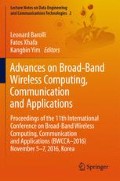Abstract
An e-voting scheme is proposed, in which the voter’s ballot is shared among all the candidates in voting phase. All candidates and voting system participate in recovering and tallying the ballot, and voting system publishes the ballot on the bulletin board in the post-voting phase. Moreover, the proposed scheme satisfies the coercion-resistant and unconditional security. In addition, other properties of electronic voting are satisfied, such as non-cheating, universal verifiability, confidentiality, anonymous.
Access this chapter
Tax calculation will be finalised at checkout
Purchases are for personal use only
Preview
Unable to display preview. Download preview PDF.
References
FujiwaraT.(2015).Voting technology, political responsiveness, and infant health: evidence from Brazil. Econometrica, vol. 83, no. 2, pp. 423-464.
Aggarwal,R., Saffi,P.A.C., Sturgess, J.(2015). The role of institutional investors in voting: evidence from the securities lending market. The Journal of Finance, 70(5), pp. 2309-2346.
Liaw,H.T.(2014).A secure electronic voting protocol for general elections. Computers and Security, 23(2), pp. 107-119.
Chang,C.C., Lee, J.S.(2006). An anonymous voting mechanism based on the key exchange protocol. Computers and Security, 25(4), pp. 307-314.
Chaum,D.L.(1981). Untraceable electronic mail, return addresses and digital pseudonyms. Communications of the ACM, 24(2), pp. 84-88.
Cortier,V.,Eigner,F., Kremer,S., et al.(2015). Type-based verification of electronic voting protocols. Principles of Security and Trust and Springer Berlin Heidelberg, pp. 303-323.
Grewal,G.S., Ryan,M.D., Chen, L., et al.(2015). Du-vote: remote electronic voting with untrusted computers. 2015 IEEE 28th Computer Security Foundations Symposium, pp.155-169.
. Ryan,P.Y.A., Schneider,S., Teague, V. (2015). End-to-end verifiability in voting systems, from theory to practice. IEEE Security and Privacy, 13(3), pp. 59-62.
Cubric,M., Jefferies,A.(2015). The benefits and challenges of large-scale deployment of electronic voting systems: university student views from across different subject groups. Computers and Education, 87, pp. 98-111.
. Chun,T.L., Min,S.H., Chi,Y.L.(2008). An electronic voting protocol with deniable authentication for mobile ad hoc networks. Computer Communications, 31, pp. 2534-2540.
. Fan,C.I., Sun,W.Z.(2008).An efficientmulti-receiptmechanismfor un-coercible anonymous electronic voting. Mathematical and Computer Modelling, 48, pp. 1661-1627.
. Francesc,S., Josep, M., Miret, J.P., Jordi,P.(2010). Simple and efficient hashbased verifiable mixing for remote electronic voting. Computer Communication, 33, pp. 667-675.
Benelux,J.C.(1986). Secret sharing homomorphism: keeping shares of a secret secret. Conference on the Theory and Application of Cryptographic Techniques, Springer Berlin Heidelberg, pp. 251-260.
Ciriani,V., Vimercati, S.D.C.D., Foresti, S., Samarati, P.(2007).K-anonymity. secure data management in decentralized systems, Springer US, 33, pp. 323-353.
. Zhang,Y., Chen, Q., Zhong, S. (2016). Privacy-preserving data aggregation in mobile phone sensing. IEEE Transactions on Information Forensics and Security, 11(5), pp. 980-992.
Xu,R., Morozov, K., Takagi, T. (2013). On cheater identifiable secret sharing schemes secure against rushing adversary. International Workshop on Security. Springer Berlin Heidelberg, pp. 258-271.
LinP.Y.2016. Distributed secret sharing approach with cheater prevention based on QR code. IEEE Transactions on Industrial Informatics, 12(1), pp. 384-392.
Chen,Z., Li, S., Zhu, Y., et al.(2015). A cheater identifiable multi-secret sharing scheme based on the Chinese remainder theorem. Security and Communication
Networks, 8(18), pp. 3592-3601.
Zhang,Y., Chen, Q.J., Zhong, S.(2016). Privacy-preserving data aggregation in mobile phone sensing. IEEE Transactions on Information Forensics and Security, 11(5), pp. 980-992.
Author information
Authors and Affiliations
Corresponding author
Editor information
Editors and Affiliations
Rights and permissions
Copyright information
© 2017 Springer International Publishing AG
About this paper
Cite this paper
Zhao, Q., Liu, Y. (2017). E-Voting Scheme Using Secret Sharing and K-Anonymity. In: Barolli, L., Xhafa, F., Yim, K. (eds) Advances on Broad-Band Wireless Computing, Communication and Applications. BWCCA 2016. Lecture Notes on Data Engineering and Communications Technologies, vol 2. Springer, Cham. https://doi.org/10.1007/978-3-319-49106-6_91
Download citation
DOI: https://doi.org/10.1007/978-3-319-49106-6_91
Published:
Publisher Name: Springer, Cham
Print ISBN: 978-3-319-49105-9
Online ISBN: 978-3-319-49106-6
eBook Packages: EngineeringEngineering (R0)

